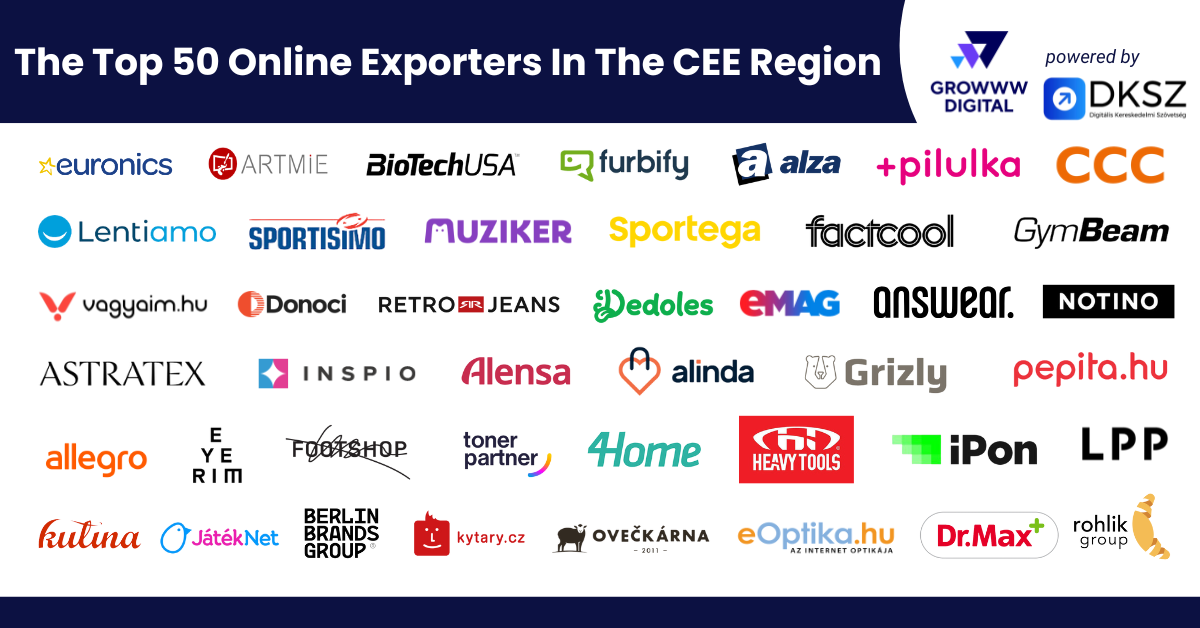
The Top 50 Online Exporters In The CEE Region
The Top 50 Online Exporters In The CEE Region

The Central and Eastern European (CEE) e-commerce sector has rebounded from its low point, experiencing a median year-over-year growth rate of 16% in 2023-2024. While growth during the COVID-19 period reached 30-50%, it slowed to below 10% in 2022-2023 before recovering.
The region’s largest e-commerce player remains Allegro, while the smallest among the top 50 is Inspio. Notably, Hungary’s Pepita saw an impressive 37-fold revenue increase over the past five years. However, only one-third of the top 50 companies managed to achieve positive revenue growth every year over the last five years—though most have now emerged from losses. Other significant fast-growing players include GymBeam and Kulina.
The leading e-commerce companies in the region adopt a global mindset, expanding rapidly and testing new markets. Many reach their break-even point within a year and actively seek new sales channels, such as marketplaces and brick-and-mortar stores. They are also investing heavily in influencer marketing and enhancing their product and value offerings. However, not all strategies have succeeded—Dedoles, for example, pursued an aggressive growth strategy but struggled with rising advertising costs and declining product quality, leading to setbacks.
Profitability has become a key focus, with companies like Rohlik demonstrating successful profit growth. Many other players have followed suit, prioritizing efficiency and shifting to sustainable growth models. This has involved leveraging AI for process automation, reducing costs, and improving operational effectiveness. As a result, the CEE e-commerce landscape is evolving, with companies striving to balance rapid expansion with financial sustainability.
“There was a huge tailwind during the pandemic, everyone could feel like a superhero. But this also had its downside, as it was just the wind blowing strongly into the sail. Now we have to row and steer.”
László Szabó, managing partner of Growww Digital
We believe profitable growth can come two ways: efficiency and revenue growth. The latter can be split into three parts: channel expansion (e.g. marketplaces), territorial expansion (opening up new countries) and product range expansion.
This article is created with you in mind if you are
A) already expanding abroad and looking for ways to improve,
B) curious to try and see that ecommerce export is not rocket science.
You need to get a few things in order and simply start doing it.
Now, let’s get to the Czech, Slovakian, Hungarian, and Polish round: Who is leading the export league and why?
Yearly revenues (in EUR) on the horizontal axis, 2020/2019, 2021/2020, 2022/2021, 2023/2022, 2024/2023, yearly revenue growth (%) on the vertical axis. The dynamically changing size of the bubbles represents YoY growth (colours: red=CZ, blue=SK, green=HU, Orange=PL, yellow=RO).
The Interactive Bubble Chart shows (press the play button for the animated view) how the ecommerce players performed over the last couple of years.
(Note: for a better vewing experience, the X axis of the graph above is not linear, but logarithmic.)
The publication of this article has been supported by DKSZ (Digital Trade Association, Hungary)
Download the full Top 50 CEE E-commerce Exporters Report here for FREE.
Have a look at the growth data and the strategies the top market players applied.
ALLEGRO
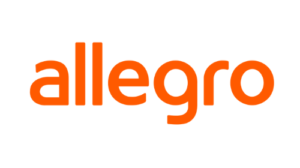
- 2024 revenue (GMV – gross merchandise value): >> SEE FULL REPORT
- 2023 revenue (GMV): 12,806,716,487 EUR
- 2022 revenue (GMV): 11,289,462,366 EUR
- 2021 revenue (GMV): 9,161,720,430 EUR
- 2020 revenue (GMV): 7,550,752,688 EUR
- 2019 revenue (GMV): 4,903,440,806 EUR
- 24/23 growth >> SEE FULL REPORT, 23/22 growth 13%, 22/21 growth 23%, 21/20 growth 21%, 20/19 growth 54%
- Number of countries: 6
The Allegro Group is a leading Polish ecommerce marketplace, which has revolutionised online shopping in the country since its inception in 1999. The company was founded by a group of entrepreneurs including Rafał Brzoska, Marcin Kuśmierz, and Grzegorz Szczebiot, who aimed to create a convenient and user-friendly online marketplace for buyers and sellers alike.
Over the years, Allegro has grown to become the dominant ecommerce platform in Poland and also in the CEE region, with millions of users and a wide range of product categories, from electronics and fashion to home and garden.
The company has invested heavily in its technology infrastructure, ensuring a smooth and secure shopping experience for its customers. Allegro has also introduced new features, such as its popular loyalty program, Allegro Smart!, which offers free shipping and additional benefits for subscribers. Moreover, the company has worked to strengthen its relationships with vendors, providing them with tools and support to help them succeed on the platform.
Despite the global challenges brought on by the COVID-19 pandemic, the Allegro Group has managed to continue its growth trajectory. In 2020, the company went public on the Warsaw Stock Exchange, marking one of the largest initial public offerings (IPOs) in the history of the Polish market.
In a strategic move to expand its presence in the Central and Eastern European ecommerce market, the Allegro Group announced the acquisition of the Czech Mall Group in 2021. This acquisition not only solidified Allegro’s position as a regional ecommerce powerhouse but also allowed the company to benefit from Mall Group’s established presence in several countries, including the Czech Republic, Slovakia, Hungary, and Slovenia.
eMAG GROUP

- 2024 revenue (GMV – gross merchandise value): >> SEE FULL REPORT
- 2023 revenue (GMV): 1,974,000,000 EUR
- 2022 revenue (GMV ): 2,162,000,000 EUR
- 2021 revenue (GMV): 2,074,400,000 EUR
- 2020 revenue (GMV): 1,364,400,000 EUR
- 2019 revenue (GMV): 1,139,400,000 EUR
- 24/23 growth >> SEE FULL REPORT, 23/22 growth -9%, 22/21 growth 4%, 21/20 growth 52%, 20/19 growth 20%
- Number of countries: 3
One of the largest online retailers in Central and Eastern Europe. Founded in 2001, the company has introduced technology-based services that help customers save time and money. Through the Marketplace channel, eMAG provides an opportunity for small and medium-sized businesses that want to take their business to the next level.
In March 2019, eMAG announced that it would merge with Extreme Digital, a Hungarian success story, also started as an online store for everything related to computers in 2001.
The merger has created a company with more than 1,000 employees only in HU and a net turnover of HUF 125 billion only from the Hungarian market, with the goal of tripling it within five years. eMAG’s Hungarian subsidiary recently switched from an online retailer to a hybrid model: in addition to its 7 stores in Budapest, the brand already has its own store in nine rural cities, and eMAG easybox allows you to pick up standard-size products at more than 450 locations nationwide.
Challenge: Uncertain economic performance and purchasing power (with some countries heavily dependent on the German economy); the increasing market share of global players in local sales and their physical presence with warehouses in these countries, which creates a competitive disadvantage for local sellers in many categories. The long shipping times that previously characterized these global platforms are no longer a significant issue. Small markets, like Hungary, become fragmented due to the high number of competitors, making it harder for small and medium-sized enterprises to thrive compared to before.
Opportunity: Those who want to succeed and grow must integrate artificial intelligence tools into their operations and strive for increasingly automated solutions. Expanding into cross-border sales—whether through their own platform or third-party marketplaces—should also be considered. These strategies can support sellers facing the challenges of small markets, stagnation, or even a shrinking market presence.
ALZA
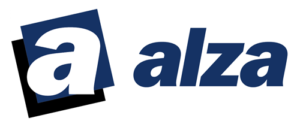
- 2024 revenue: >> SEE FULL REPORT
- 2023 revenue: 1,862,000,000 EUR
- 2022 revenue: 1,702,000,000 EUR
- 2021 revenue: 1,755,000,000 EUR
- 2020 revenue: 1,468,969,377 EUR
- 2019 revenue: 1,152,540,959 EUR
- 24/23 growth >> SEE FULL REPORT, 23/22 growth: 9%, 22/21 growth -3%, 21/20 growth 19%, 20/19 growth: 27%
- Number of countries: 5
Founded 1994, Alza is marketing-savvy for some, and not-my-cup-of-tea for others. Nonetheless, their 2020 turnover that amounted to 1.47 billion EUR speaks for itself. Alza is native to the Czech Republic and fully localized in Slovakia, Hungary, Germany, and Austria.
Their export strategy stands on the basis of Alza’s long presence in Czechia, where this market leader has been able to keep reinventing themselves for almost two decades now. This green alien marketplace is all about convenience and understanding modern customers’ needs.
“Next-day delivery is not good enough,” says Petr Bena, Vice Chairman of the Board at Alza.cz. Thanks to almost 2000 Alza Boxes, next-day delivery has become a standard, so it was time to push things further in cities such as Prague, as well as in new markets. In Budapest, for instance, Alza’s opening their first downtown warehouse to shorten delivery times even more. “The shorter the delivery, the better the web conversion,” Bena adds.
Expanding west is desired by many, and for Alza, the reason is belief that they have what it takes to satisfy demanding customers. The DACH region and beyond means more competition, but at the same time, they rely on fast delivery and Alza Boxes as their competitive advantage. Their plan is to further expand to at least ten EU countries by 2026. Focusing on B2B is another priority.
Marketing-wise, Alza aims to reach everyday people with their message. Just like Dedoles or Factcool, they opted for a mascot to make the brand memorable. We at Growww Digital see Alza as the “Amazon of CEE”: they combine a customer-first approach with high levels of business intelligence and marketing.
Your Free Top 50 CEE E-commerce Exporters Report: Download It Now
Have a look at the growth data and the strategies the top market players applied.
DR.MAX Group
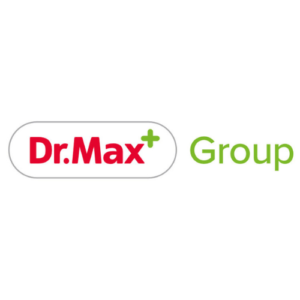
- 2024 revenue: >> SEE FULL REPORT
- 2023 revenue: 4,648,000,000 EUR (est.)
- 2022 revenue: 4,209,000,000 EUR (est.)
- 2021 revenue: 3,831,000,000 EUR (est.)
- 2020 revenue: 3,582,000,000 EUR (est.)
- 2019 revenue: 3,398,000,000 EUR (est.)
- 24/23 growth >> SEE FULL REPORT, 23/22 growth 10%, 22/21 growth 10%, 21/20 growth 7%, 20/19 growth 5%
- Number of countries: 8
Dr.Max Group is one of the leading pharmacy chains in Central and Eastren Europe, operating a significant network of pharmacies across several countries, including the Czech Republic, Slovakia, Poland, Serbia, and Romania.
Since its inception, the company has been known for offering a comprehensive range of pharmaceuticals and health-related products and services. Dr.Max pharmacies provide both prescription and over-the-counter medications, dietary supplements, cosmetic products, and medical devices. Furthermore, it prides itself on providing excellent customer service and personalised advice on healthcare and prevention, all delivered by a team of experienced pharmacists and healthcare professionals.
Dr.Max Group, backed by Penta Investments, focuses not only on providing top-quality products but also on innovation in the pharmaceutical field. It is constantly seeking ways to enhance the accessibility and affordability of healthcare, from improving its in-store offerings to advancing its online platforms.
The company has been pioneering the concept of e-pharmacy, which includes online consultations and home deliveries of medications. Dr.Max is committed to playing a leading role in transforming the pharmacy market, aiming to make healthcare more convenient and patient-oriented. It remains dedicated to its vision of offering high-quality care that meets the diverse needs of communities across the CEE region.
NOTINO

- 2024 revenue: >> SEE FULL REPORT
- 2023 revenue: 1,100,000,000 EUR
- 2022 revenue: 1,030,000,000 EUR
- 2021 revenue: 737,000,000 EUR
- 2020 revenue: 563,000,000 EUR
- 2019 revenue: 369,000,000 EUR
- 24/23 growth >> SEE FULL REPORT, 23/22 growth 7%, 22/21 growth 40%, 21/20 growth 31%, 20/19 growth 53%
- Number of countries: 27
Kings of small countries? That’s Notino‘s latest approach to expansion. After securing their position on the Polish, German, and Romanian markets, which have the highest turnover for this fragrance marketplace, Notino announced further expansion to Latvia, Lithuania, Estonia, and Ireland earlier in 2021.
Today, their Brno store is the biggest perfume and cosmetic store in Czechia and a place where customers can try the new patented technology AirParfum. Augmented reality, starting with tools such as Shade Finder, Fragrance Finder, or a virtual mirror are Notino’s other priorities.
They have two distribution centers in Rajhrad and Bucharest (which allows a clearer pathway to the South and East of Europe). Next year, they’ll be opening another one in Italy to get closer to customers in Spain and Portugal.
In terms of expansion, we need to highlight their online penetration approach: instead of reaching for the lowest hanging fruit, they invested rather massively in brand recognition right from the start (YouTube campaigns, etc.).
CCC GROUP
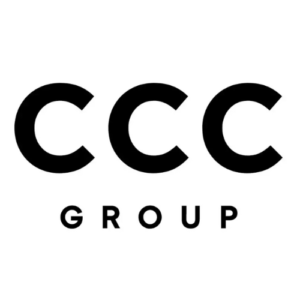
- 2024 revenue (online, est.): >> SEE FULL REPORT
- 2023 revenue (online, est.): 1,037,362,637 EUR
- 2022 revenue (online, est.): 1,020,206,452 EUR
- 2021 revenue (online, est.): 827,187,097 EUR
- 2020 revenue (online, est.): 541,625,806 EUR
- 2019 revenue (online, est.): 290,483,871 EUR
- 24/23 growth >> SEE FULL REPORT, 23/22 growth 2%, 22/21 growth 23%, 21/20 growth 53%, 20/19 growth: 86%
- Number of countries: 13
The Polish CCC Group is a leading footwear retailer and manufacturer, and one of the biggest ecommerce companies in Central and Eastern Europe.
Established in 1999 by Dariusz Miłek, the company began as a small footwear store in Polkowice, Poland. Over the years, the CCC Group has expanded its operations, eventually becoming a major player in the European footwear industry.
The company’s success can be attributed to its continuous commitment to offering a wide range of fashionable and affordable products, as well as its strategic acquisitions and store openings throughout the region. Today, the CCC Group operates a vast network of stores across multiple countries, including Poland, Germany, Austria, Hungary, Czech Republic, Slovakia, and others. The Group has approx. 90 e-commerce platforms and 950 stores in 28 countries under the CCC, eobuwie.pl, Modivo and DeeZee brands.
In recent years, the CCC Group has been focusing on the development and implementation of innovative technologies and practices to enhance its business operations. By adopting a multi-channel approach, the company aims to provide a seamless shopping experience to customers both online and offline. This strategy has helped the CCC Group to strengthen its market position, as well as expand its customer base and product offerings.
Additionally, the CCC Group has demonstrated a commitment to sustainability and social responsibility. The company has undertaken several initiatives to minimize its environmental impact, such as implementing more eco-friendly manufacturing processes and utilizing sustainable materials in its products.
LPP S.A.
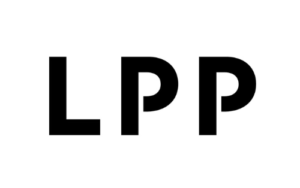
- 2024 revenue (online, est.): >> SEE FULL REPORT
- 2023 revenue (online, est.): 923,076,923 EUR
- 2022 revenue (online, est.): 923,225,806 EUR
- 2021 revenue (online, est.): 843,010,753 EUR
- 2020 revenue (online, est.): 469,677,419 EUR
- 2019 revenue (online, est.): 231,827,957 EUR
- 24/23 growth >> SEE FULL REPORT, 23/22 growth 0%, 22/21 growth 10%, 21/20 growth 79%, 20/19 growth 103%
- Number of countries: 35
LPP is a Polish clothing manufacturer with a history dating back to 1991. It is one of the most rapidly developing and biggest clothing companies in Central and Eastern Europe, boosting not only the economic growth of Poland but also consistently channelling investments towards bolstering local businesses. LPP exports to nearly 40 markets worldwide and manage five popular fashion brands: Reserved, Cropp, House, Mohito and Sinsay.
LPP is a highly respected clothing company based in Poland that was established in 1991. The founders embarked on a mission to produce quality clothing while uplifting the Polish economy and local entrepreneurship. Over the years, it has stayed true to its vision and principles, continually contributing to the nation’s export sector and fostering a thriving local business ecosystem. Today, it’s recognized as one of the most rapidly developing apparel manufacturers in Central and Eastern Europe.
In terms of growth, LPP has seen remarkable progress. Within three decades, its footprint has extended to nearly 40 markets worldwide. From a single-country operation, it has transformed into a global powerhouse that drives Polish exports, contributing significantly to the country’s international commerce. Alongside, it continues to invest heavily in developing local businesses, thereby stimulating economic growth at home.
In 2020, the company underwent a digital transformation in response to the COVID-19 pandemic restrictions on stationary trade, becoming an omnichannel organisation. The distinction between online and stationary sales was eliminated, and both channels are now treated as a customer-centric whole. After the market stabilized, LPP resumed its foreign expansion policy and opened the first stores of all its brands in North Macedonia, strengthening its position in South-Eastern Europe.
The company has adopted a new development strategy to expand further in central, southern, and western Europe and increase sales volumes in the e-commerce channel. In the near future, LPP plans to introduce all brands in Albania and open Sinsay stationary stores in Greece and Italy.
ROHLIK GROUP

- 2024 revenue: >> SEE FULL REPORT
- 2023 revenue: 700,000,000 EUR (est.)
- 2022 revenue: 574,000,000 EUR (est.)
- 2021 revenue: 490,000,000 EUR (est.)
- 2020 revenue: 300,000,000 EUR (est.)
- 2019 revenue: 150,000,000 EUR (est.)
- 24/23 growth >> SEE FULL REPORT, 23/22 growth 22%, 22/21 growth 17%, 21/20 growth 63%, 20/19 growth 100%
- No. of countries: 6
We’ve all been keen to watch this European unicorn grow. After Kifli (Hungary), Gurkerl (Austria), Knuspr (Germany), and announcing new market entries in 2022 as Sezamo (Italy, Spain and Romania), many are eagerly wondering: “Where next?” In its land of origin, the Czech Republic, Rohlik has been closely watched since the very beginning, as a new startup founded by an accomplished entrepreneur, Tomáš Čupr.
Founded on May 21st, 2014 (interestingly, the second online grocery provider in Czechia, Košík, was founded on May 23rd that very same year), its growth has been steady, but on the CEE level, Rohlik hasn’t been viewed as extraordinary. That is, until the last couple of years. In 2020, Rohlik’s revenue grew by 100% YoY to more than 300 million EUR. And then, more happened:
First, Rohlik has been venture-backed from the very beginning. After Czech Miton, Rohlik got close to 200 million EUR from VCs from both France and California,as well as global operator Index Ventures. This raises Rohlik’s total funding to over 400 million EUR over the course of four rounds. Second is a proven business model focusing on delivering high-quality global and local brands including farm-fresh food and goods from regional small businesses.
Rohlik has been refining their market-entry strategy with each country. In Munich, Knuspr reached the first 1000 order threshold with record speed. “This reminded us of the time they entered the Hungarian market as Kifli,” Growww Digital’s Alexandra Mezei recalls.
“We were deep in the first lockdown, and their Facebook and Instagram profiles showed an average organic reach of around 150,000. Working on their authentic branding campaign, we managed to skyrocket to 2.5 million in just two months. It remained above this number for the rest of the 6-month collaboration. On average, the organic reach was 2.7 million.” Read Zero to Hero: Insider Look into Kifli’s Viral Social Media Campaign.
From a digital marketing standpoint, it’s the branding and communication strategies that play towards Rohlik’s likability, namely its mix of authenticity, trendiness, and consistency.
PEPITA
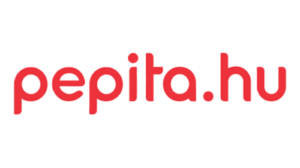
- 2024 revenue (GMV – gross merchandise value): >> SEE FULL REPORT
- 2023 revenue (GMV ): 56,288,618 EUR
- 2022 revenue (GMV): 38,660,403 EUR
- 2021 revenue (GMV): 24,732,494 EUR
- 2020 revenue (GMV): 11,096,710 EUR
- 2019 revenue (GMV): 1,898,334 EUR
- 24/23 growth >> SEE FULL REPORT, 23/22 growth 46%, 22/21 growth 56%, 21/20 growth 123%, 20/19 growth 485%
- Number of countries: 6
“We have come a long way since the foundation of our company Pepita.hu in 2017. From a marketplace for babies and moms, our goal has been to become the first best family online store,” founders of Pepita, József Dorcsinecz and Zoltán Varga share on their website. With new categories in place (breeding of pets, gardening, DIY, and leisure), there are currently nearly 3 million products available.
“Currently, Pepita Group is operating in 6 countries: Hungary, Romania, Slovakia, Germany, Poland and Bulgaria. We believe that our secret formula is our team, the culture, and the attitude which the founders implemented into the operation.”
Their goal is to become a significant player in these markets and launch new countries as well, while we continuously develop our services further to provide opportunities for local retailers and other ecommerce companies to expand their sales to international markets.
Your Free Top 50 CEE E-commerce Exporters Report: Download It Now
Have a look at the growth data and the strategies the top market players applied.
ALENSA

- 2024 revenue: >> SEE FULL REPORT
- 2023 revenue: 97,100,000 EUR
- 2022 revenue: 85,000,000 EUR
- 2021 revenue: 78,957,758 EUR
- 2020 revenue: 67,114,094 EUR
- 2019 revenue: 49,743,387 EUR
- 24/23 growth >> SEE FULL REPORT, 23/22 growth 14%, 22/21 growth 8%, 21/20 growth 18%, 20/19 growth 35%
- Number of countries: 32
Founded 2004 by Jaromir Kijonka and Radek Hejl, this contact lens company experienced a huge setback when their colleague opened a rival company. This episode made them go quietly about their business. Is this quiet determination the secret of their success? It might just be.
With Europe pretty much conquered, Alensa looks further into South America and Asia. Such expansion demands a unified brand, but you bet the domain Alensa.com was already taken. Not afraid to go big, they paid EUR70,000 to buy it out. We at Growww Digital believe there’s a lesson in there for all of us.
But back to what we like about their export story – back when the company was still working their way up, the breakthrough came with expansion abroad. Some countries showed interesting growth potential from the beginning, while others looked like they better be closed soon. But Alensa turned them all into profit, eventually. “Our growth is not linear but rather in waves according to which markets are currently successful,” founders agree.
Their go-to strategy is harmonization of operations across Europe. “Every market is slightly different: that is true and we always adapt. However, in Europe, there is not really a major difference. So it is a very good idea to unify communication and operations across multiple markets or put markets together in segments, “ CMO Jan Jelínek explains.
Another key thing is the use of technology and automation when it comes to marketing, pricing, or even purchasing of goods. Nowadays, lots of technology is accessible and very powerful. This helps us with the marketing harmonization process, and we are able to manage 32 markets with a fairly small marketing team of about 17 people.”
One of their hardest lessons learnt, according to Jelínek, was admitting that local solutions are not always the best option when you try to manage multiple markets. “For ecommerce, we rely on technology immensely, and very often it is easier to migrate your key technology to a global solution rather than forcing an existing tool that works perfectly, but only on one or two markets.”
In terms of profit strategy, Alensa had to win in the margin game. Their business is based on “micro-mark-ups”: mark-up on lenses is often almost zero, so the profit comes from lens accessories as well as from glasses and sunglasses (both are new parts of their product portfolio).
ASTRATEX

- 2024 revenue: >> SEE FULL REPORT
- 2023 revenue: 47,374,655 EUR
- 2022 revenue: 47,990,880 EUR
- 2021 revenue: 47,125,069 EUR
- 2020 revenue: 31,750,020 EUR
- 2019 revenue: 26,348,085 EUR
- 24/23 growth >> SEE FULL REPORT, 23/22 growth -1%, 22/21 growth 2%, 21/20 growth 48%, 20/19 growth 21%
- Number of countries: 14
What started more than 20 years ago as a cliché garage store, is today the biggest ecommerce store with underwear and swimwear in CEE.
In the past years, the company experienced growth thanks to both the pandemic and changes within the company that started in 2018 (the investment group Hartenberg bought a majority of Astratex‘s shares). Apart from Czechia, this popular fashion store is fully localized in Slovakia, Poland, Romania, Hungary, Bulgaria, Ukraine, Croatia, Slovenia, and Greece.
They ascribe their success to three pillars:
1) a customer-focused approach, including customer support,
2) high-quality products,
3) easy shopping and easy return policy.
GYMBEAM

- 2024 revenue: >> SEE FULL REPORT
- 2023 revenue: 148,530,783 EUR
- 2022 revenue: 87,902,536 EUR
- 2021 revenue: 54,106,437 EUR
- 2020 revenue: 34,795,660 EUR
- 2019 revenue: 19,578,499 EUR
- 24/23 growth >> SEE FULL REPORT, 23/22 growth 69%, 22/21 growth 62%, 21/20 growth 55%, 20/19 growth: 78%
- Number of countries: 15
Another exciting CEE success is called Gym Beam. Founded in 2013 by Dalibor Cicman, this one-stop-shop for everything sports nutrition, functional foods, and equipment for active lifestyles now serves customers in 14 countries in Central Europe and the Balkans.
They closed 2020 with a EUR34 million turnover, 78% YoY growth and a 6 million EUR investment from Crowdberry and Slovak Investment Holding (historically the biggest ecommerce investing round in Slovakia). They attribute their success to changes in customer behaviour during Covid, agile organization, and the ability to respond to the situation promptly. Big investments right before the pandemic gave them the means to execute these changes.
From a digital marketing standpoint, we see their ecommerce strategy as a prompt reaction to trends based on data analysis, combined with interactive ways of marketing and product innovation, supported by localised customer service.
By 2025, Gym Beam plans to secure leadership positions in the CEE and Balkan markets, complete the automatization process in distribution, build a development centre for their own branded products, enter DACH countries, and be the first Slovak company to enter the Frankfurt Stock Exchange.
BERLIN BRANDS GROUP
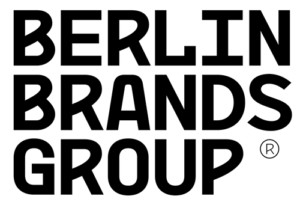
- 2024 revenue (CEE): >> SEE FULL REPORT
- 2023 revenue (CEE): 74,500,000 EUR
- 2022 revenue (CEE): 80,100,000 EUR
- 2021 revenue (CEE): 80,900,000 EUR
- 2020 revenue (CEE): 57,300,000 EUR
- 2019 revenue (CEE): 35,700,000 EUR
- 24/23 growth >> SEE FULL REPORT, 23/22 growth -7%, 22/21 growth -1%, 21/20 growth 41%, 20/19 growth 61%
- Number of countries: 28 (in CEE)
it all started as a small website with DJ equipment. Peter Both and Dominik Brichta still make sure they keep selling quality, high-design products at affordable prices, as this is definitely their standout factor in the market and a reason they grew from a duo to over 1,000 people from Los Angeles to China.
After being merged with German partners, they developed and stabilized a portfolio of 14 in-house brands with more than 3,000 products.
Their expansion stands on several legs. Apart from the product portfolio, it’s the tech behind BBG, namely their own algorithm of selecting top products and then using an omnichannel strategy to place them. No wonder BBG is one of the biggest sellers on Amazon.
SHOPBUILDER / BIOTECH USA
![]()
- 2024 revenue: >> SEE FULL REPORT
- 2023 revenue: 210,187,788 EUR
- 2022 revenue: 189,005,385 EUR
- 2021 revenue: 149,424,658 EUR
- 2020 revenue: 96,570,737 EUR
- 2019 revenue: 65,089,751 EUR
- 24/23 growth >> SEE FULL REPORT, 23/22 growth 11%, 22/21 growth 26%, 21/20 growth 55%, 20/19 growth 48%
- Number of countries: 103 (including all foreign markets to where shipping is available)
One of the largest manufacturers of sports nutrition in Europe understood the power of ecommerce and digital marketing. The company started in 1993 as a family business.
It was a small family business distributing gym equipment in Hungary, but after a while, he realized there are greater opportunities in sport-related food supplements,” CEO Bálint Lévai, son of the founder, recalls. Over the past 20 years, the business has grown into a massive company with 3,000 partners in 80 countries, and official online stores fully localized in 8.
Their annual turnover exceeded 240 million EUR in 2024. Their expansion is fuelled by marketing, from professional athletes as influencer partners and ambassadors, to TV campaigns.
We at Growww Digital like to see a player with this much acquisition stamina. In the past few years alone, BioTechUSA acquired their Hungarian competitor, Scitec Nutrition, as well as the online store Shopbuilder. They’re also targeting Western Europe via Amazon. All in all, a perfect example of a progressive manufacturer scaling both horizontally and vertically.
ANSWEAR

- 2024 revenue: >> SEE FULL REPORT
- 2023 revenue: 281,318,681 EUR
- 2022 revenue: 209,247,312 EUR
- 2021 revenue: 154,086,022 EUR
- 2020 revenue: 83,548,387 EUR
- 2019 revenue: 66,926,237 EUR
- 24/23 growth >> SEE FULL REPORT, 23/22 growth 34%, 22/21 growth 36%, 21/20 growth 84%, 20/19 growth 25%
- Number of countries: 12
Answear is a renowned Polish online store operated by Answear.com S.A. It offers clothing, footwear, and accessories across eleven countries: Poland, Ukraine, Czech Republic, Slovakia, Romania, Bulgaria, Greece, Croatia, Slovenia, Hungary, and Cyprus. The store provides quick delivery, often within 24 hours, and a personal shopper service. Each month, Answear.com receives over 6 million visitors.
Answear is a multibrand online store that offers products of various price ranges from over 400 brands. The company operates its own logistics centre, which enables cost optimisation and logistics improvement. In the interest of environmental protection and customer convenience, all items in an order are delivered in a single package.
The online platform was established in December 2010 in Poland, with its official launch happening in February 2011. By 2012, Answear had initiated its loyalty program, AnswearClub, one of the first of its kind in the fashion industry. In 2013, the MCI Venture Capital investment fund invested in the development of the store, acquiring a minority stake in the company.
Over the years, Answear started expanding into Central and Eastern European countries. It opened its online store in the Czech Republic in April 2014, followed by Slovakia in June the same year. The store continued to expand into Ukraine in July 2015, Romania in November 2015, Hungary in 2016, Bulgaria in late 2018, Greece and Croatia in 2021 and Slovenia in 2022.
The company carried out a public offering worth over PLN 80 million in December 2020, and its shares debuted at the Warsaw Stock Exchange in January 2021. In 2023, Answear announced the acquisition of the brands Sneakerstudio and PRM.
Answear has a history of collaboration with celebrities, actors, artists, models, and influencers, including notable figures such as Maja Sablewska, Patrycja Kazadi, and Julia Wieniawa among others. The online store has initiated special campaigns, not only related to fashion but also tackling important topics such as ecology, inspiring in various life areas.
SPORTEGA

- 2024 revenue: >> SEE FULL REPORT
- 2023 revenue: 24,018,400 EUR
- 2022 revenue: 21,391,900 EUR
- 2021 revenue: 20,178,000 EUR
- 2020 revenue: 19,819,305 EUR
- 2019 revenue: 12,872,207 EUR
- 24/23 growth >> SEE FULL REPORT, 23/22 growth 12%, 22/21 growth 6%, 21/20 growth 2%, 20/19 growth 54%
- Number of countries: 11
Originally a sports equipment store for hockey and tennis players, bikers, and runners, they started under the name SportObchod. In 2021, the two founders Josef Mech and Martin Došel (together with their 110 employees) added outdoor equipment as well as a symbiotic acquisition of Fitness 4U with food supplements for bodybuilding. The acquisition is aimed to increase their competitive ability on foreign markets. SportObchod is currently in Czechia, Slovakia, and all DACH countries.
Earlier in 2021, they secured a major investment from Hartenberg Holding for further expansion: Hungary, France, and Italy are next. Their goal is to create a one-stop-shop for all sportspeople.
Challenge: A significant challenge in the e-commerce market in the CEE region is the dominance of large marketplaces, which can limit the growth potential of smaller retailers and their ability to differentiate in a highly competitive environment.
Opportunity: On the other hand, the digitalization of services offers a tremendous opportunity, as it enables businesses to enhance customer experience, streamline operations, and explore innovative sales channels across the region.
GRIZLY

- 2024 revenue: >> SEE FULL REPORT
- 2023 revenue: 19,880,000 EUR
- 2022 revenue: 21,587,840 EUR
- 2021 revenue: 16,629,000 EUR
- 2020 revenue: 11,111,000 EUR
- 2019 revenue: 6,340,000 EUR
- 24/23 growth >> SEE FULL REPORT, 23/22 growth -8%, 22/21 growth 30%, 21/20 growth 50%, 20/19 growth 75%
- Number of countries: 5
Founded in 2014 by Dominik Píchal, this nut and health food online store seems to be slowly but surely cracking the ecommerce success code. While in 2015, they shipped one order per week, it was 600 in 2016 and double the amount by 2017.
Before the pandemic, they were managing 2,400 orders weekly and in 2020 sold over 1.5 tons of nuts. Since 2016, Grizly has been selling their own branded products, too. Their 2020 turnover was 11.1 million EUR, with a 75% YoY growth. In 2021, they expanded to Poland (after Czechia, Slovakia and Hungary), added their 100th employee, and won a Quality Award in the Czech Webshop Awards (Shop Roku 2020).
Since 2015, eRockets own 15% of Grizly, driving their further expansion based on quality customer experience, expedition, and shipping.
Your Free Top 50 CEE E-commerce Exporters Report: Download It Now
Have a look at the growth data and the strategies the top market players applied.
SMYK
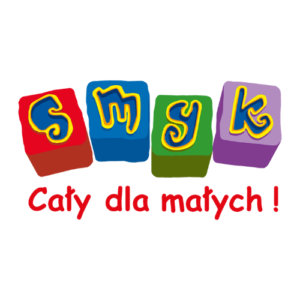
- 2022 revenue: 128,700,000 EUR
- Number of countries: 3
Smyk is a renowned Polish brand of children’s products. The Smyk retail network includes over 220 physical stores in Poland, the online store smyk.com, as well as nearly 40 owned stores in Romania and Ukraine. In addition, their own brands, Cool Club and Smiki, are available in over 200 physical stores and more than 10 online partners across 23 countries in Europe and Asia.
Smyk stores offer a wide selection of clothing, footwear, toys, infant accessories, and other products for children aged 0–14. One of the network’s strengths is the availability of a diverse range of products for children of different age groups “under one roof”.
In 2000, Smyk became an independent company, Smyk sp. z o.o., and separated from Centrum Department Stores. The further expansion of the retail chain involved the opening of 35 stores in major cities across Poland. In 2004, Smyk was incorporated into NFI Hetman.
After establishing its network format and positioning the brand in Poland, the company focused on international development. In 2006, Smyk opened its first store outside of Poland in the “Das Schloss” shopping center in Berlin, followed by another store in the “Ukraina” shopping center in Kiev. From 2008 to 2017, the chain also operated in the Russian market.
Smyk Group sells products under their own brands, primarily “COOL CLUB” and “SMIKI”, which are exclusively available at Smyk stores or franchise partner stores.
INGLOT
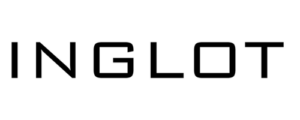
- Number of countries: 42
Inglot Cosmetics, a Polish makeup company headquartered in Przemyśl, has established itself as one of the most successful global brands in the industry. With over 950 boutique stores spread across 90 countries, Inglot offers a diverse range of makeup products. A remarkable 95% of their product line is manufactured in their facility located in Przemyśl.
The company was founded in 1983 by Wojciech Inglot, who initially started with a state-owned pharmaceutical plant before transitioning into cosmetics production. In 1987, they released their first nail polish, marking the beginning of their journey in the beauty industry.
Since then, Inglot has expanded internationally, opening stores worldwide, and collaborating with renowned fashion brands and artists such as Kenzo, Michael Costello, Jennifer Lopez, and Francesco Scognamiglio. Inglot has also been a makeup partner for musicals on Broadway in New York, such as Mamma Mia!, Chicago, The Lion King, and Wicked.
Their range consists of over 2,500 products, ensuring that everyone can find the perfect shade for themselves. The company does not test any products or components on animals and is listed as a cruelty-free brand by PETA. Approximately 60% of their assortment is vegan, certified by the internationally recognized organization V-label. They also hold a Halal certification, covering a significant portion of their product range.
DONOCI
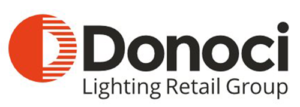
- 2024 revenue: >> SEE FULL REPORT
- 2023 revenue: 65,576,000 EUR
- 2022 revenue: 78,181,000 EUR
- 2021 revenue: 68,183,000 EUR
- 2020 revenue: 50,400,000 EUR
- 2019 revenue: 26,100,000 EUR
- 24/23 growth >> SEE FULL REPORT, 23/22 growth -13%, 22/21 growth 10%, 21/20 growth 35%, 20/19 growth 93%
- Number of countries: 26 (10 in CEE)
The oldest of the bunch, Donoci has been on the market for 26 years. Over time, they’ve expanded from the Czech Republic into Slovakia, Germany, Austria, Hungary, Poland, Romania, France, Spain, and Italy, serving customers in 26 countries in total.
For us, they really are a brand that understood the power of localization during expansion. Starting with their name – Donoci works internationally (although it has a meaning in Czech: “till late night”). Their localized brands change based on the native languages: Svět Svítidel for the Czech Republic, Luminam for Romania, and so on.
As their export partner in multiple CEE countries, we see how Growww Digital and Donoci are a good fit because of their result-driven mindset as well as high-level expertise on both sides.
“Donoci knows where they’re going, what they want, and how to achieve it. We are proud to have been executing their export strategy in multiple countries over the past 4 years,” Growww Digital’s co-founder Laszló Szábó explains.
OTCF S.A. / 4F

2022 revenue: 70,100,000 EUR
Number of countries: 40
It all started with Horn Partner, a company founded by Igor Klaja in 1995 entering the sportswear industry. In the beginning, the company started supplying basic sportswear and accessories to wholesalers and retail outlets. Their first brand, Outhorn, launched in 1998, remains operational to this day.
In 2003, the company ventured into direct retailing, inaugurating their initial sports clothing stores under the brand name 4Fun. Later, in 2007, the brand evolved into 4F Sport Performance and has been functioning as 4F since 2010. In the same year the new company name, OTCF S.A. was introduced under which they still operate.
Over the years, OTCF S.A. consistently expanded the 4F store network all over Poland and in 2016, they started to expand internationally by opening stores in Latvia, Slovakia, Romania, and the Czech Republic.
The brand portfolio comprises seven brands, including 4F, 4F Junior, 4 Fuel, 4F Spot, Outhorn, SportStyleStory, and Under Armour. We take pride in being the sole distributor of Under Armour in Poland.
The leading brand in the company’s portfolio is 4F, which offers high-quality everyday and sportswear as well as sports accessories. Brand ambassadors include Anna and Robert Lewandowski. The brand currently operates 230 stores across across the CEE region and has its products available in approximately 500 multi-brand stores in 40 countries.
In 2023, the company expanded internationally by opening salons in Qatar, a second store in Bangkok, and a concept store in Vilnius. It launched the 4 Change strategy to promote sustainability, focusing on circular fashion and environmental collaboration. Additionally, 4F became the official kit supplier for the Ukraine national football team at the 2024 Paris Olympics.
Lentiamo
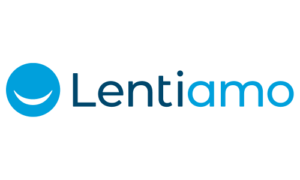
- 2024 revenue: >> SEE FULL REPORT
- 2023 revenue: 34,199,005 EUR
- 2022 revenue: 31,785,413 EUR
- 2021 revenue: 27,961,472 EUR
- 2020 revenue: 25,606,956 EUR
- 2019 revenue: 24,995,033 EUR
- 24/23 growth >> SEE FULL REPORT, 23/22 growth 8%, 22/21 growth 14%, 21/20 growth 9%, 20/19 growth 2.5%
- Number of countries: 17
Lentiamo (formerly VašeČočky) is a Czech eye care retailer. It started as an e-shop with contact lenses and accessories. Since September 2017, it also offers quality sunglasses from dozens of international brands and in April 2020, it launched online sales of dioptric glasses.
In July 2019, it opened its first brick-and-mortar opticians in Prague. The company operates in 17 European countries.
Lentiamo is a group of dedicated professionals from the heart of Europe who want to reshape the world of eyewear. With the aim of offering customised vision aids and professional advice, Lentiamo is an ambitious brand with many years of experience in eyewear and eye care.
In addition to its affinity for premium optics, the company also embodies a commitment to fair prices, safe shopping and superior products. Tested by real optometrists, Lentiamo sells top-quality glasses, contact lenses, sunglasses and computer glasses.
Challenge: CEE region is very competitive and at the same time the customers have very high expectations. The companies that operate on these markets (at least in our segment) are technologically advanced (e.g. more than on many Western markets) so we need to continuously innovate and seek better ways how to serve our customers.
Opportunity: In our case, it’s the segment of prescription glasses. The majority of our potential customers in CEE region still go to physical stores to get their prescription glasses even though they could save a lot of money buying online. Buying prescription glasses online is more common on Western markets. Furthermore, the customers risk nothing. Lentiamo takes all the risk. Our customers returned only 7% of orders with prescription glasses we made for them in 2024 online and we refunded all of them.
ARTMIE
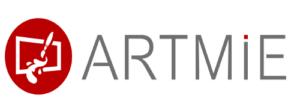
- 2024 revenue: >> SEE FULL REPORT
- 2023 revenue: 5,350,000 EUR
- 2022 revenue: 5,840,000 EUR
- 2021 revenue: 6,520,000 EUR
- 2020 revenue: 6,050,000 EUR
- 2019 revenue: 3,700,000 EUR
- 24/23 growth >> SEE FULL REPORT, 23/22 growth -8%, 22/21 growth -10%, 21/20 growth 8%, 20/19 growth 64%
- Number of countries: 15
It all began in 2007, when, through the carefully collected ideas of founders Valerian and Danka, their young team, and the skilled hands of graphic designers, one of the family-owned e-shops of ARTMIE was born. This is how the story begins, right in the heart of Europe, with just a few talented helpers at the start. They were united by a love of art and creation, and it didn’t take long before the world around them started to notice.
Over time, the team grew, new creation enthusiasts joined, valuable experience was gained, fantastic ideas emerged, and the most exciting products were introduced. This growth soon led them to move to new premises, and their warehouses began to expand. A few years later, malirske-platno.cz made its way to neighbouring countries, changed its logo, and continued to delight in beautiful creative items.
With full commitment, they embarked on producing their own professional canvas on solid wooden frames. These are custom-made by an Italian family-owned workshop, among the finest on the market.
The following years brought not only growth but also entry into new markets and a mountain of innovations that we decided to explore and test. They created the creative studio CreativLab, where daily experiments are conducted with paints, brushes, and an array of artistic materials.
KAZAR
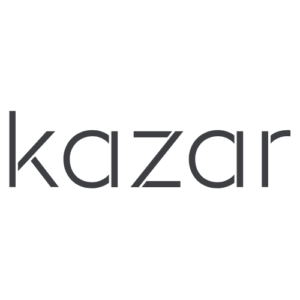
2022 revenue: 36,000,000 EUR
Number of countries: 7
Kazar Group was established in 1996, with the Kazar brand operating in the market since 1990. With its unwavering commitment to global trends and years of expertise, Kazar has established itself as a leading premium brand in the market.
The company operates the Kazar salon network, located in shopping centres throughout Poland. In 2013, the company opened its first international Kazar salon in Bucharest. The company operates its online store in 8 languages, but accepts orders from 23 countries across Europe.
Offering a wide array of products, including footwear, bags, accessories, perfumes, and the Home Fragrance line, Kazar has become one of the fastest-growing brands in Europe.
Renowned for its contemporary designs, Kazar products are distinguished by their impeccable craftsmanship and the highest standards of quality. The brand’s collections cater to modern customers who value originality, embracing a range that spans from classic and elegant options to avant-garde and daring proposals, ensuring a diverse and captivating selection for all fashion enthusiasts.
SPORTISIMO

- 2024 revenue: >> SEE FULL REPORT
- 2023 revenue: 417,616,542 EUR
- 2022 revenue: 392,689,696 EUR
- 2021 revenue: 407,870,154 EUR
- 2020 revenue: 321,476,668 EUR
- 2019 revenue: 338,707,540 EUR
- 24/23 growth >> SEE FULL REPORT, 23/22 growth 6%, 22/21 growth -4%, 21/20 growth 27%, 20/19 growth -5%
- Number of countries: 25
Sportisimo, founded in 2000 by two Vietnamese-Czech businessmen, Thai Ngoc Nguyen and Son Do Hong, is a Czech retail chain selling sports equipment with over 200 stores across Europe. The company, which opened its first store in Mladá Boleslav in 2001, is the leading retailer of sports footwear, apparel, and equipment in the Czech Republic and Slovakia.
By 2022, Sportisimo had outlets in the Czech Republic, Slovakia, Romania, Hungary, Bulgaria, Croatia, and ecommerce platforms in most Central European markets. The company primarily targets families with children, offering an extensive range of global sports brands, along with its own licensed brands.
Sportisimo’s growth milestones included its expansion into Slovakia and the launch of its e-commerce platform in 2008, making it one of the first sports equipment e-shops in the Czech Republic. In 2011, it won the Retailer of the Year award among sports equipment sellers. In 2015, it expanded into Romania and later, Hungary in 2016, following an investment by shareholders aiming to build a Western-style sports equipment retailer.
The years 2020-2021 saw a significant increase in revenue from the e-shop due to pandemic restrictions. The company invested over CZK 1 billion in moving its central warehouse from Rudná near Prague to Ostrava – Hrušov, aiming for a substantial logistics improvement.
Your Free Top 50 CEE E-commerce Exporters Report: Download It Now
Have a look at the growth data and the strategies the top market players applied.
MUZIKER

- 2024 revenue: >> SEE FULL REPORT
- 2023 revenue: 83,614,468 EUR
- 2022 revenue: 72,284,485 EUR
- 2021 revenue: 78,800,000 EUR
- 2020 revenue: 59,500,000 EUR
- 2019 revenue: 46,300,000 EUR
- 24/23 growth >> SEE FULL REPORT, 23/22 growth 16%, 22/21 growth -8%, 21/20 growth 32%, 20/19 growth 29%
- Number of countries: 31
With a simple vision to turn dreams into hobbies, Muziker has become one of the largest stores selling musical instruments, golf equipment, and other lifestyle and hobby products in Central and Eastern Europe.
“Guitars, basses, keyboards, bikes, scooters, skateboards or boats, golf bags, and trolleys. You can choose from more than 70,000 products from more than 850 premium global brands,” their website says, now localized into over 15 languages and active in 30 countries. Apart from that, Muziker has built a dozen brick-and-mortar stores across Czechia and Slovakia.
Interestingly, their story goes as far back as 1995, when a small Slovak company called Planet Music opened its first musical instrument shop in the center of Bratislava, and it wasn’t until 2018 that they branched out into golf, sailing, yachting, and art equipment, as well as bikes, skis and other technological gadgets.
PILULKA

- 2024 revenue: >> SEE FULL REPORT
- 2023 revenue: 85,200,000 EUR
- 2022 revenue: 96,616,581 EUR
- 2021 revenue: 94,749,309 EUR
- 2020 revenue: 70,280,932 EUR
- 2019 revenue: 48,908,685 EUR
- 24/23 growth >> SEE FULL REPORT, 23/22 growth -12%, 22/21 growth 2%, 21/20 growth 35%, 20/19 growth 44%
- Number of countries: 3
One of the winners of the pandemic, but only because they grabbed the opportunity. The technological company in the pharma field founded by Petr Kasa and Martin Kasa turned shifting consumer interest in both personal health and online shopping for pharmaceuticals. In 2020, Pilulka entered the Prague stock market and grew their number of employees significantly.
Their plan for growth is written in two parts. The first is widening their product portfolio and services (from cosmetics, supplements, and sport nutrition to e-health and gadgets for surveilling health, all the way to building Pilulka clinics) as well as increasing the availability of current products.
The second is, to no-one’s surprise, expansion abroad. Pilulka is now a market leader in Czechia and Slovakia and at the same time one of the fastest growing ecommerce companies in CEE. In 2018, they opened in Romania, and in 2022 they further expanded to Austria and Hungary.
KYTARY.CZ
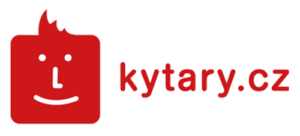
- 2024 revenue: >> SEE FULL REPORT
- 2023 revenue: 43,381,366 EUR
- 2022 revenue: 41,000,000 EUR
- 2021 revenue: 41,000,000 EUR
- 2020 revenue: 36,500,000 EUR
- 2019 revenue: 28,000,000 EUR
- 24/23 growth >> SEE FULL REPORT, 23/22 growth 6%, 22/21 growth 0%, 21/20 growth 12%, 20/19 growth 30%
- Number of countries: 12
Work hard, play hard might as well be Kytary’s motto, because so far, almost all of Europe is their playground. Apart from Czechia, Slovakia, Poland, Romania, Hungary, Germany, Austria, Italy and France, the musical instrument company widened their sphere of influence to Ireland, Spain and the Netherlands in 2021.
What’s the secret to their success? As a former partner on their journey for five fruitful years, it’s hard to pick just one. Their understanding of their customer base as well as regional nuances might just be at the top of the list. Kytary is successful because they are ready to offer new customers products that are not easily available on their market.
Our business runs very well in our home country, and we can copy and paste crucial tactics and processes – a well-designed ecommerce store, precise customer care and our targeted media mix,” Černý says. Their hardest export lesson so far has been Brexit. “We’re still in deep desperation. No one could imagine and therefore prepare. You can do nothing with such external influences.”
Their insider tip to become a top exporter is one of our favourites: “Be a specialist; be honest in business. Take care of your customers and try not to lose them. It is really expensive to acquire them.”
iPON.hu

- 2024 revenue: >> SEE FULL REPORT
- 2023 revenue: 50,000,000 EUR
- 2022 revenue: 31,745,930 EUR
- 2021 revenue: 35,731,227 EUR
- 2020 revenue: 32,727,362 EUR
- 2019 revenue: 26,027,373 EUR
- 24/23 growth >> SEE FULL REPORT, 23/22 growth 58%, 22/21 growth -11%, 21/20 growth 9%, 20/19 growth 26%
- Number of countries: 6
From incorporation in 2004 to over 60 employees today, iPon strives to be the most customer-centric company where people can find and discover virtually anything they want to buy online. Together with the online store, iPon runs a special technical targeted magazine.
By giving customers more of what they want, from low prices, vast selection, technical content, and convenience, iPon continues to grow and evolve as a high-class ecommerce platform. Apart from its Hungarian homebase Hungary, the brand operates in Germany, Austria, Slovenia, Romania and Croatia.
Challenge: The biggest challenge in e-commerce is organizing and executing logistical processes. All competitors, including us at iPon.hu, strive to maximise the quality of services in this area, whether it’s home delivery, delivery to a pickup point, or personal collection in the most convenient way for consumers. The expansion of international companies like Temu or Vinted puts a significant strain on shipping companies in the region, especially during peak commercial periods, leading to an inevitable decline in service quality. In my opinion, this will be the greatest challenge for online businesses in the coming years.
Opportunity: The past two years have been about the rise of artificial intelligence—nowadays, almost everyone is familiar with terms like AI or ChatGPT. However, I see the greatest opportunity in how e-commerce companies can implement these technologies in various areas and leverage them to their advantage. AI has opened up new horizons in human resource optimization, international expansion, and customer service. If companies recognize this in time and adequately train and educate their employees, they can gain long-term business advantages without geographical limitations.
Your Free CEE Expansion Guide: Download It Now
67 pages packed with all you need to know as an ecommerce business before you expand to Czechia, Slovakia, Hungary, Romania, Croatia and Slovenia.
DEDOLES
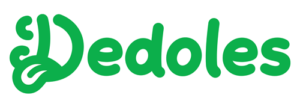
- 2024 revenue: >> SEE FULL REPORT
- 2023 revenue: 40,226,292 EUR
- 2022 revenue: 60,539,294 EUR
- 2021 revenue: 93,000,000 EUR
- 2020 revenue: 49,437,135 EUR
- 2019 revenue: 14,587,774 EUR
- 24/23 growth >> SEE FULL REPORT, 23/22 growth -34%, 22/21 growth -35%, 21/20 growth 88%, 20/19 growth 239%
- Number of countries: 16
Founded in 2011 by Jaroslav Chrapko, Dedoles started as a T-shirt reselling company. After participating in a business acceleration contest, they launched their first signature sock set in 2018 – cheeky and full of character, just like their dancing hamster TV campaign.
The brand marketers among us have huge respect for Dedoles for understanding what branding is all about. Winning the Trend Shop Award in 2020 as well as a Golden Effie are just some highlights of this recognition.
Apart from a strong marketing leg, their export success is based on growing their signature colourful portfolio from socks to seasonal fashion, from swimwear to slippers and Christmas sweaters. The third part is increasing their offline presence.
Challenge: One of the most significant challenges in the CEE e-commerce space is the growing competition from Chinese market players, who often operate under different regulations and have virtually unlimited investment capabilities. Additionally, rising advertising costs and shifting consumer sentiment demand more efficient marketing strategies and a deeper understanding of local customer needs.
Opportunity: On the other hand, there is substantial growth potential through greater adaptation to local specifics, expanding into new product categories, and forming innovative partnerships that resonate with customers. A strong emphasis on efficiency—built on data-driven insights and local expertise—can yield sustainable and rapid scalability across the region.
FOOTSHOP
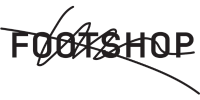
- 2024 revenue: >> SEE FULL REPORT
- 2023 revenue: 42,880,000 EUR
- 2022 revenue: 41,058,034 EUR
- 2021 revenue: 41,739,036 EUR
- 2020 revenue: 33,508,056 EUR
- 2019 revenue: 29,921,663 EUR
- 24/23 growth >> SEE FULL REPORT, 23/22 growth 4%, 22/21 growth -2%, 21/20 growth 25%, 20/19 growth 12%
- Number of countries: 18 (in CEE)
Founded in 2011 by Peter Hajduček and Marcel Vargaeštók, this streetwear and skate shoe shop has been one to watch for quite some time. They started as a pure online shop and added offline along the way. Nowadays, they have brick and mortar stores in Prague, Bratislava, Budapest and Bucharest.
Between 2017 and 2019, they doubled their turnover, which resulted in 2020 figures at more than EUR33 million . In 2021, they acquired their rivals, Queens and merged with Flex Dog (a curated sneaker catalogue). When it comes to export, they understood the potential that lies eastward – their expansion is very much focused on the Balkans and now they are present in 8 countries in CEE and all together have e-stores in 20 differnet languages.
Apart from building brick and mortar stores, their export strategy benefits from the business model itself – Footshop is pretty much built on being an exclusive partner for limited Adidas, Nike and Vans collections.
4HOME
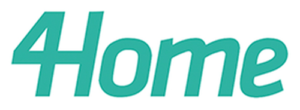
- 2024 revenue: >> SEE FULL REPORT
- 2023 revenue: 48,112,040 EUR
- 2022 revenue: 48,112,040 EUR
- 2021 revenue: 45,479,668 EUR
- 2020 revenue: 34,741,413 EUR
- 2019 revenue: 21,437,031 EUR
- 24/23 growth >> SEE FULL REPORT, 23/22 growth 0%, 22/21 growth 6%, 21/20 growth 31%, 20/19 growth 62%
- Number of countries: 5
Operating since 2004, 4HOME is now present in the Czech Republic, Slovakia, Poland, Hungary, Romania and Ukraine. What started as a catalogue seller is now a company many look upon and learn from.
“We’re always entering new markets when we feel ready,” CMO Jan Skalický says. They build their success on knowing local customs and having the bandwidth to start something new.
“Our speed and strategy depend on what’s happening in ongoing markets, which are perhaps more important than opening in a new one. The final decision to tackle a new country stems from being profitable, overall. When it comes to expansion itself, we´re humble and focused on performance marketing,” Skalický adds.
Overpreparation in understanding local customs is paying off, and 4HOME has gone a long way from their first Polish expansion. If you want to thrive as an exporter, you have to “be careful with translations, focus on local customs, get inspired by local, successful competitors, and on the other hand add your uniqueness, the thing that was created and has succeeded in your home market,” according to Skalický.
RETRO JEANS

- 2024 revenue: >> SEE FULL REPORT
- 2023 revenue: 17,633,943 EUR
- 2022 revenue: 15,600,123 EUR
- 2021 revenue: 15,261,236 EUR
- 2020 revenue: 9,493,000 EUR
- 2019 revenue: 12,935,641 EUR
- 24/23 growth >> SEE FULL REPORT, 23/22 growth 13%, 22/21 growth 2%, 21/20 growth 61% , 20/19 growth -27%
- Number of countries: 6
A retail apparel company with a significant export presence across 6 CEE countries, Retro Jeans now ranks among bigger companies with up to 500 employees. Right upon its incorporation in 2001, founder Zoltan Csoknyay envisioned creating a denim lifestyle brand.
“The brand’s original source of inspiration derived from the founders fascination with American vintage style, fused with European take on wearing denim,” Retro Jeans site says.
Their goal has been to be a leading denim lifestyle brand that offers high quality casual products at affordable prices, and with an online store offering a wide range of clothing, shoes and accessories, as well as retail shops, they might be well on the way!
OVEČKÁRNA
![]()
- 2024 revenue: >> SEE FULL REPORT
- 2023 revenue: 12,970,000 EUR
- 2022 revenue: 11,362,000 EUR
- 2021 revenue: 7,505,000 EUR
- 2020 revenue: 3,830,000 EUR
- 2019 revenue: 1,386,000 EUR
- 24/23 growth >> SEE FULL REPORT, 23/22 growth 13%, 22/21 growth 51%, 21/20 growth 96%, 20/19 growth 176%
- Number of countries: 10
Ovečkárna started in 2009 by Martin Bernátek as a family business. In the past couple of years especially, they’ve been continually growing in both turnover and team.
“Our approach towards expansion has refined over the last couple of years. We jumped into Hungary and Romania because it was trending, not necessarily because we were ready. Proper localisation was our biggest lesson learnt. At one point, the Czech word for wool, ‘vlna’, was translated as ‘wave’,” Bernátek shares candidly.
“As a result, we’ve become much more tactical in long-term strategy. Expansion on our terms means not only launching a localized online store, but also educating the market about sheep wool and its advantages. Sheep wool has been historically used all across Europe, from the Alps to Turkey, Slovakia, the UK and even Scandinavia, and we’d like to build on that tradition. Communicating its use and benefits in the 20th century is a strategy that helped us grow significantly in our home market, and we intend to replicate it in countries we are currently in, as well as new ones we’re planning to expand to.”
Ovečkárna has a unique product in a growing market, as well as their own brand Vlnka, which makes them an ideal candidate for expansion. Today’s customers demand high-quality, natural products that are ethically, locally, and sustainably made,“ says David Hort, the Investment Manager at Hartenberg Capital.
Curious about their insider tips for future big exporters? “I’d actually challenge the thought that export is always a good idea. I’m not saying don’t expand, but make sure it is the right time for you. Taking the time to do the Czech market right, we outgrew our export performance.”
INSPIO

- 2024 revenue: >> SEE FULL REPORT
- 2023 revenue: 2,341,647 EUR
- 2022 revenue: 2,493,182 EUR
- 2021 revenue: 2,754,423 EUR
- 2020 revenue: 1,865,675 EUR
- 2019 revenue: 542,416 EUR
- 24/23 growth >> SEE FULL REPORT, 23/22 growth -6%, 22/21 growth -9%, 21/20 growth 48%, 20/19 growth 244%
- Number of countries: 26
This Slovakian family company started in 2005 as ARTšablóny. Rebranding to Inspio only happened in 2018, with expansion starting in 2019. Their first market was Hungary (rather than Czechia, which is interesting), followed by Czechia, Slovakia, Germany, Romania and Austria. In 2021, Inspio decided to tackle 5 countries all at once: France, Italy, the Netherlands, Spain and Belgium.
Their last expansion was very well strategically prepared and handled from a digital marketing standpoint, focusing on full localization as well as narrowing down product portfolio items and testing the potential in the countries they chose as a good fit.
“Planning ahead and then iterating is key. You don’t want to simply open in a new country by setting a EUR1,000 / day campaign. Your website has to fully work in that new country, even if it means you’ll turn off all products and start with three,” CEO Slavomíra Kollárová shares.
They learned a lot of lessons with SEO indexing, URL localisations, automating transaction emails, SMS, and building an in-house customer care team. Their go-to approach for expansion? “We set everything we do for great growth. And we do not exaggerate with perfection. The e-shop has to earn money; it doesn’t need to be perfect. There will be plenty of time to improve it after the expansion,” Kollárová believes.
Their lesson learnt when it comes to expansion, according to Kollárová, is finding reliable partners. “At the beginning, you have to outline in detail every service that you order for the expansion, and check it before the payment for the service. Many people only pretend to be experts. The reality is oftimes completely different.”
Your Free Top 50 CEE E-commerce Exporters Report: Download It Now
Have a look at the growth data and the strategies the top market players applied.
FACTCOOL

- 2024 revenue: >> SEE FULL REPORT
- 2023 revenue: 82,231,434 EUR
- 2022 revenue: 81,324,324 EUR
- 2021 revenue: 81,703,086 EUR
- 2020 revenue: 52,077,636 EUR
- 2019 revenue: 29,745,299 EUR
- 24/23 growth >> SEE FULL REPORT, 23/22 growth 1%, 22/21 growth 0%, 21/20 growth 57%, 20/19 growth 75%
- Number of countries: 14
Factcool, established in 2015, is a Slovakian company dedicated to the sale of women’s, men’s, and children’s clothing and accessories. Throughout their existence, they have diligently transformed from a local company to one that is present in 26 countries across Europe. Their efforts continue towards our goal of becoming one of the largest e-commerce players in the European apparel industry.
Factcool firmly believes that a wide range of high-quality but especially affordable goods is what their customers need. They do not focus on mainstream brands; the challenge is to continuously seek out something special for our customers. You can choose from over 400,000 items.
HEAVY TOOLS
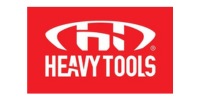
- 2024 revenue: >> SEE FULL REPORT
- 2023 revenue: 4,245,200 EUR
- 2022 revenue: 3,322,564 EUR
- 2021 revenue: 3,492,569 EUR
- 2020 revenue: 2,864,397 EUR
- 2019 revenue: 1,743,181 EUR
- 24/23 growth >> SEE FULL REPORT, 23/22 growth 28%, 22/21 growth -5%, 21/20 growth 22%, 20/19 growth 64%
- Number of countries: 5
Founded as early as 1997, Heavy Tools is one of the fastest growing Hungarian mass market fashion brands, with distributors in Czechia, Greece, and Romania as well as their own retail stores in Hungary and Slovakia.
Challenge: Market inequalities, differing consumer demands, regulations, and infrastructure in various contexts can pose obstacles for e-commerce businesses. These challenges include customs clearance for shipments from third countries, consumer protection regulations, linguistic and cultural preferences, and price sensitivity.
Opportunity: E-commerce holds enormous market potential, with the rapid growth of digitalization and an increasing number of consumers adapting to it, including in the CEE region. Additionally, market penetration in some countries of the region (Romania, Bulgaria, Slovakia) is lower than in Western Europe, presenting opportunities for expansion.
EYERIM

- 2024 revenue: >> SEE FULL REPORT
- 2023 revenue: 13,535,318 EUR
- 2022 revenue: 10,355,078 EUR
- 2021 revenue: 9,337,599 EUR
- 2020 revenue: 6,189,420 EUR
- 2019 revenue: 6,654,849 EUR
- 24/23 growth >> SEE FULL REPORT, 23/22 growth 31%, 22/21 growth 11%, 21/20 growth 51%, 20/19 growth -7%
- Number of countries: 14
What started as a sunglasses store is now considered the fastest growing online optician in CEE. Founders Martin Zahuranec and Andrea Zahurancova got investment early on, and with adding dioptric glasses in 2020, they managed to grow into having a nearly EUR10 million turnover, and they now serve customers in 15 countries.
“Shopping for glasses online is still a bit unusual, but Eyerim bets on a personal approach to customers and technologies,” Zahuranec explains.
In 2017, they introduced virtual mirror features, and in 2020, they secured another EUR1.7 million investment to prepare more functions. Some of the next steps are supposed to be eye exams via the internet, and with leaps in telemedicine, Eyerim just needs to be prepared to employ the newest technologies.
A lean approach to business also serves them well, both on the domestic market and during expansion: Eyerim keeps a small team, relies on external logistics partners, and tries to keep the end price for customers as accessible as possible.
KULINA
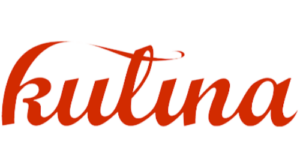
- 2024 revenue: >> SEE FULL REPORT
- 2023 revenue: 12,618,279 EUR
- 2022 revenue: 8,980,932 EUR
- 2021 revenue: 6,339,518 EUR
- 2020 revenue: 4,002,961 EUR
- 2019 revenue: 647,493 EUR
- 24/23 growth >> SEE FULL REPORT, 23/22 growth 41%, 22/21 growth 42%, 21/20 growth 58%, 20/19 growth 518%
- Number of countries: 18
A premium brand for everything cooking, baking and dining, Kulina has grown from Czech company into a CEE success story. Founded in 2009, they’ve become a household name but also got into troubles right before the pandemic.
With the new owner focused on a product portfolio combining design and quality for geeky chefs and home cooks, they turned things around and now offer over 10,000 home design products from more than 100 brands.
Ecommerce Exporters On The Rise:
FURBIFY (SK)

- 2024 revenue: >> SEE FULL REPORT
- 2023 revenue: 11,300,000 EUR
- 2022 revenue: 10,032,863 EUR
- 2021 revenue: 13,140,562 EUR
- 2020 revenue: 8,823,368 EUR
- 2019 revenue: 4,262,692 EUR
- 24/23 growth >> SEE FULL REPORT, 23/22 growth 13%, 22/21 growth -24%, 21/20 growth 49%, 20/19 growth 106,99%
- Number of countries: 4
Furbify is a Slovakian company that specialises in the refurbishment and sale of premium quality computing devices such as business laptops and PCs.
Their journey began in 2007 in a small room, initially focusing on computer servicing and maintenance of small systems. Later, they expanded their operations by opening a small PC shop.
Over time, they acquired numerous schools and government institutions as clients. The initial successes fuelled their ambition, and they ventured into larger and bolder projects. As a result, opened their first online store in the Slovak market, followed by expanding operations to several countries, including Hungary since 2014. Today, Furbify is selling tens of thousands of refurbished laptops and PCs across Europe.
Their mission is to promote refurbished computers as excellent value-for-money recycled products. They aim to extend the lifespan of manufactured goods, ensuring they cycle through multiple uses rather than ending up in landfills.
ZONDO (SK)

- Number of countries: 5
Zondo is a part of Novynabytok.sk, the largest online store with furniture and home furnishings in Slovakia. Founded in 2009 out of a dorm room in Bratislava by two university classmates, this furniture retail business has grown to a company with more than 60 employees, operating 8 ecommerce stores in 5 markets with its own warehouse and in-house logistics courier.
In 2018, MOB Interier expanded into Hungary and Romania under the registered brand name Zondo. In 2020, the company expanded further to Croatia.
In Slovakia the company is present with novynabytok.sk, in the Czech Republic hezkynabytek.cz, and in new markets under the brand name Zondo: zondo.hu, zondo.ro, zondo.hr.
“What we do is essentially cargo ecommerce and with that you need to approach expansion carefully and slowly simply because shipping 250 kg sofas from Slovakia to the coast of the Black Sea is much more difficult than sending a small parcel to Australia and back,” Explains Tomas Temer, who, together with David Kapusniak, are responsible for developing new markets. “The biggest obstacle to growing rapidly is finding a reliable logistics partner in any new market.”
TONERPARTNER
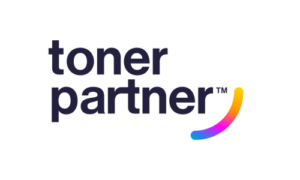
- 2024 revenue: >> SEE FULL REPORT
- 2023 revenue: 24,845,200 EUR
- 2022 revenue: 22,657,360 EUR
- 2021 revenue: 13,264,431 EUR
- 2020 revenue: 10,911,611 EUR
- 2019 revenue : 4,649,017 EUR
- 24/23 growth >> SEE FULL REPORT, 23/22 growth 10%, 22/21 growth 71%, 21/20 growth 22%, 20/19 growth 135%
- Number of countries: 9
After gaining many years of experience in the toner business, the TonerPartner ecommerce store came to life in 2014 in Ostrava, Czechia. In the same year, the company came up with its own brand of alternative refills and a year later foreign expanison began.
Through Slovakia, the path led to Hungary (2018) and Poland (2019). In 2020, two more countries, Germany and Romania, were added to the “expansion portfolio”, and a year later TonerPartner entered the Croatian market and then set foot in Austria and Slovenia.
Along with geographical expansion, TonerPartner expanded its product range as well. In 2019, printers, scanners, and 3D printers were added to the original and compatible cartridges. In 2020, a partial rebranding took place and the company mascot was introduced.
And expansion of the product range continued—with office supplies, office equipment, the category of hygiene, and refreshments for companies and other products in 2021. TonerPartner is no longer just a supplier of printer cartridges, but has become a reliable partner for every office or household.
FIXSERVIS.sk
![]()
Started 2013, this growing star saw an opportunity in tackling e-waste from used electronics and built a viable business model, offering accessible electronic parts, tools, and even second-hand electronics.
Jateknet.hu (HU)

This Hungarian family-run toy business founded in 2005 now serves more than 1 million customers all over Europe, with 110 employees and 250 million orders per year.
- 2024 revenue: >> SEE FULL REPORT
- 2023 revenue: 18,552,008 EUR
- 2022 revenue: 24,675,190 EUR
- 2021 revenue: 25,205,479 EUR
- 2020 revenue: 22,117,641 EUR
- 2019 revenue: 9,415,521 EUR
- 24/23 growth >> SEE FULL REPORT, 23/22 growth -33%, 22/21 growth -2%, 21/20 growth 14%, 20/19 growth 135%
- Number of countries: 2
eOptika.hu (HU)

A great customer experience and fast delivery of a huge portfolio is what Hungarian eOptika is betting on in export.
- 2024 revenue: >> SEE FULL REPORT
- 2023 revenue: 7,869,704 EUR
- 2022 revenue: 8,078,962 EUR
- 2021 revenue: 5,494,521 EUR
- 2020 revenue: 5,298,630 EUR
- 2019 revenue: 3,861,797 EUR
- 24/23 growth >> SEE FULL REPORT, 23/22 growth -3%, 22/21 Growth 47%, 21/20 Growth 4%, 20/19 Growth 37%
- Number of countries: 5
ALINDA (HU)

This regional homegoods online shop is another Hungarian export success story in the making. After expanding to Slovakia, tha Czech Republic and Romania, there’s more to come.
- 2024 revenue: >> SEE FULL REPORT
- 2023 revenue: 9,740,000 EUR
- 2022 revenue: 9,994,563 EUR
- 2021 revenue: 10,839,551 EUR
- 2020 revenue: 11,705,534 EUR
- 2019 revenue: 7,802,195 EUR
- 24/23 growth >> SEE FULL REPORT, 23/22 growth -3%, 22/21 growth -8%, 21/20 growth -7%, 20/19 growth 50%
- Number of countries: 5
PELENKA.HU
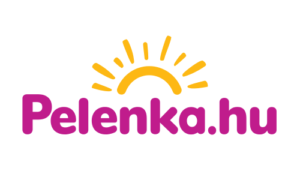
- 2024 revenue: >> SEE FULL REPORT
- 2023 revenue: 17,633,943 EUR
- 2022 revenue: 9,657,328 EUR
- 2021 revenue: 5,167,795 EUR
- 2020 revenue: 3,118,405 EUR
- 2019 revenue: 806,047 EUR
- 24/23 growth >> SEE FULL REPORT, 23/22 growth 13%, 22/21 growth 87%, 21/20 growth 66%, 20/19 growth 287%
- Number of countries: 1
After its launch in 2018, Pelenka.hu quickly became the market leader in the baby-mom segment and earned almost all professional awards for its operation (Internet retailer of the year 2020, Digital retailer of the year 2022, The country’s favorite baby-mom store 2018-2022 ).
The company is currently the largest Hungarian-owned FMCG e-retailer, which, with the purchase of the Beauty.hu webshop, expands its position in the field of beauty industry in serving the female target group. The operator of Pelenka.hu, Webshop Global Kft., is a direct partner of the largest manufacturing companies, has a large stock of its own, and in many cases has grown to become the largest domestic e-retailer partner of the distributed brands.
“Until now, our focus has been on domestic growth, the market and brand building, but as a strengthened and leading player in the domestic market, we see the time to introduce our know-how internationally.” – Zoltán Csereklei, Managing Director
vagyaim.hu
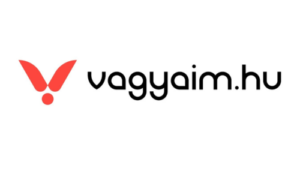
- 2024 revenue: >> SEE FULL REPORT
- 2023 revenue: 6,706,129 EUR
- 2022 revenue: 6,408,804 EUR
- 2021 revenue: 5,293,412 EUR
- 2020 revenue: 4,660,274 EUR
- 2019 revenue: 3,624,274 EUR
- 24/23 growth >> SEE FULL REPORT, 23/22 growth 5%, 22/21 growth 21%, 21/20 growth 14%, 20/19 growth 29%
- Number of countries: 16
Vagyaim.hu, headquartered in Hungary, was launched in 2007. Its success is attributed to its high-quality services and its strong emphasis on sexual education. With these values, it entered Slovakia and the Czech Republic in 2016. Following its successful foreign presence, we will be expanding into neighboring countries in 2024: Austria, Germany, Romania, Slovenia, and Croatia.
Challenge: In the CEE region it is difficult to understand and adapt to the diverse languages and shopping habits. Too many countries, too many players.
Opportunity: The free movement of goods within the European Union and the advancements in language models (LLMs). Expanding abroad has never been this easy!
LUMENET
![]()
- 2022 revenue: 4,576,325 EUR
- 2021 revenue: 4,267,030 EUR
- 2020 revenue: 3,597,304 EUR
- 2019 revenue: 2,866,559 EUR
- 22/21 growth 7%, 21/20 growth 19%, 20/19 growth 26%
- Number of countries: 1
Lumenet was founded in 2011 by Hungarian professionals with the aim of reforming the Hungarian market. Thanks to their enthusiasm, continuous innovation and well-chosen, value-for-money product range, they are now the leaders in the Hungarian lighting e-commerce market.
One of their most exciting innovations is their own video studio, unique in Europe, which allows them to produce 10-20 4K videos and hundreds of stunning product photos per day. A good example of the high quality visual experience is their website https://lumenet.hu/lakasvilagitas, where you can see what it’s like when a site works with its own premium quality images rather than those of its manufacturers.
In recent years they have made a lot of changes in order to be able to compete in the international market. Among other things, they have closed their physical store to focus on online operations, outsourced logistics to increase scalability, eliminated bespoke projects and automated B2B services. Telephone customer service has also been discontinued, replaced by automated form and chat-based communication.
EURONICS (HUNGARY)

- 2024 revenue: >> SEE FULL REPORT
- 2023 revenue: 225,654,415 EUR
- 2022 revenue: 221,701,458 EUR
- 2021 revenue: 219,178,082 EUR
- 2020 revenue: 193,874,364 EUR
- 2019 revenue: 177,941,616 EUR
- 24/23 growth >> SEE FULL REPORT, 23/22 growth 2%, 22/21 growth 1%, 21/20 growth 13%, 20/19 growth 9%
- Number of countries: 29
Vöröskő Kft., a Hungarian-owned company, was founded in 1989. Initially operating within Veszprém County, the company expanded beyond its regional boundaries in 1994 and now has a nationwide presence with 64 stores. Specialising in the retail of technical products and related services, the company has grown significantly, employing over 1,000 people. As a family business, it fosters long-term relationships among employees, with many family members working together.
In 2001, Vöröskő Kft. joined the international Euronics purchasing group, granting it exclusive rights to the brand name and business model in Hungary while remaining under Hungarian ownership. (euronics.hu) This partnership allows the company to participate in global promotions and offer European-quality household, entertainment, and IT products.
In 2008, it launched its own online store, continually enhancing its e-commerce services. With the opening of its first large stores in Budapest in 2011, the company began expanding into Eastern Hungary, further strengthening its national reach.
INSPORTLINE

- 2024 revenue: 4,293,789 EUR (est.)
- 2023 revenue: 3,701,543 EUR
- 2022 revenue: 3,781,080 EUR
- 2021 revenue: 3,794,288 EUR
- 2020 revenue: 3,556,415 EUR
- 2019 revenue: 1,775,095 EUR
- 24/23 growth 16%, 23/22 growth -2%, 22/21 growth 0%, 21/20 growth 7%, 20/19 growth 100%
- Number of countries: 7
inSPORTline is one of the TOP 5 sports equipment retailers in Central Europe, but it holds the TOP 1 position in its own segment, specializing in home fitness equipment and home gym machines. The key to its success lies in building trust, supported by high-quality services, customer-oriented order fulfillment, and product support.
The product range includes over 22,000 sports, outdoor, and motorcycling items, with stock distributed across multiple EU warehouses. They continuously refresh the selection with an average of 100+ new products each month. They consciously build their customer base and align their IT developments accordingly.
Did we get them all?
In case you think we have missed somebody who deserves a place among the top CEE exporters list, please let us know, and we will update the article.
We can help you grow (and make the list)!
Did you know that through localised digital marketing, we’ve been actively contributing to 15 of the success stories above? For those who would like to be amongst the biggest CEE players, contact us for help, or feel free to reach out to László Szabó, managing partner and Head of Growth at Growww Digital, at szabo@growwwdigital.com or +36 30 537 7051
Fill in the form and download the full Top 50 CEE E-commerce Exporters Report here for FREE. Have a look at the growth data and the strategies the top market players applied.
